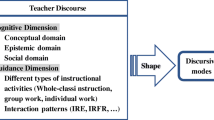ABSTRACT
Innovative educational approaches in the sciences have emphasized inquiry in the classroom but it is not self-evident that inquiry instruction leads to conceptual understanding. A design research cycle was conducted to investigate how physics instruction aimed at creating a classroom culture of inquiry can contribute to Grade 9 students’ understanding of theoretical concepts in direct current electric circuits. A hypothesized local instruction theory and classroom pedagogy were created in cooperation with 3 physics teachers, emphasizing (a) establishing classroom norms of inquiry, (b) providing a theoretical starting point, (c) using targeted experiments guided by conceptual questions, and (d) theory-oriented, whole-class discussions. After data collection, retrospective analysis of 1 class showed that the enactment of the local instruction theory and the development of classroom norms of inquiry had led to the expected learning processes and increased student conceptual understanding. Science education promoting the nature of science as inquiry might consider the importance of an effective local instruction theory and the social classroom processes that require science-oriented classroom norms.
Similar content being viewed by others
REFERENCES
Chatila Afra, N., Osta, I. & Zoubeir, W. (2009). Students’ alternative conceptions about electricity and effect of inquiry-based teaching strategies. International Journal of Science and Mathematics Education, 7, 103–132.
Cobb, P., Confrey, J., diSessa, A., Lehrer, R. & Schauble, L. (2003). Design experiments in educational research. Educational Researcher, 32(1), 9–13.
Cobb, P. & Yackel, E. (1998). A constructivist perspective on the culture of the mathematics classroom. In F. Seeger, J. Voigt & U. Waschescio (Eds.), The culture of the mathematics classroom (pp. 158–190). Cambridge, UK: Cambridge University Press.
Duit, R. (2009). Bibliography STCSE: Students’ and teachers’ conceptions and science education. Retrieved from http://www.ipn.uni-kiel.de/aktuell/stcse/stcse.html.
Engelhardt, P. V. & Beichner, R. J. (2004). Students’ understanding of direct current resistive electrical circuits. American Journal of Physics, 72(1), 98–115.
Gravemeijer, K. & Cobb, P. (2006). Design research from a learning design perspective. In J. Van den Akker, K. Gravemeijer, S. McKenney & N. Nieveen (Eds.), Educational design research (pp. 18–51). London, England: Routledge.
Gunstone, R., Mulhall, P. & McKittrick, B. (2009). Physics teachers’ perceptions of the difficulty of teaching electricity. Research in Science Education, 39, 515–538.
Hart, C. (2008). Models in physics, models for physics learning, and why the distinction may matter in the case of electric circuits. Research in Science Education, 38, 529–544.
Hogenbirk, P., Cornelisse, M., Frankemölle, J., Jager, D., Majewski, R. & Timmers, T. (2007). Natuurkunde overal, 3 havo en 3 vwo [Physics everywhere, Grade 9] (4th ed.). Houten, The Netherlands: EPN.
Hung, D. & Chen, D.-T. V. (2007). Context–process authenticity in learning: implications for identity enculturation and boundary crossing. Educational Technology Research and Development, 55, 147–167.
Kock, Z.-J., Taconis, R., Bolhuis, S. & Gravemeijer, K. (2013). Some key issues in creating inquiry-based instructional practices that aim at the understanding of simple electric circuits. Research in Science Education, 43(2), 579–597.
Leach, J. T. & Scott, P. H. (2002). Designing and evaluating science teaching sequences: an approach drawing upon the concept of learning demand and a social constructivist perspective on learning. Studies in Science Education, 38(1), 115–142.
Maxwell, J. A. (2004). Causal explanation, qualitative research, and scientific inquiry in education. Educational Researcher, 33(2), 3–11.
Melville, W., Bertley, A. & Fazio, X. (2013). Scaffolding the inquiry continuum and the constitution of identity. International Journal of Science and Mathematics Education, 11, 1255–1273.
Minner, D. D., Levy, A. J. & Century, J. (2010). Inquiry-based science instruction—what is it and does it matter? Results from a research synthesis years 1984 to 2002. Journal of Research in Science Teaching, 47(4), 474–496.
Nijland, F. J. (2011). Mirroring interaction: An exploratory study into student interaction in independent working (Doctoral dissertation). Retrieved from http://arno.uvt.nl/show.cgi?fid=121427.
Osborne, J., Collins, S., Ratcliffe, M., Millar, R. & Duschl, R. (2003). What “ideas-about-science” should be taught in school science? A Delphi study of the expert community. Journal of Research in Science Teaching, 40(7), 692–720.
Park, J., Jang, K.-A. & Kim, I. (2009). An analysis of the actual processes of physicists’ research and the implications for teaching scientific inquiry in school. Research in Science Education, 39, 111–129.
Sengupta, P. & Wilensky, U. (2009). Learning electricity with NIELS: thinking with electrons and thinking in levels. International Journal of Computers for Mathematical Learning, 14, 21–50.
Taconis, R. & Kessels, U. (2009). How choosing science depends on students’ individual fit to ‘science culture’. International Journal of Science Education, 31(8), 1115–1132.
Treagust, D. F. & Duit, R. (2008). Conceptual change: a discussion of theoretical, methodological and practical challenges for science education. Cultural Studies of Science Education, 3, 297–328.
Author information
Authors and Affiliations
Corresponding author
Electronic supplementary material
Below is the link to the electronic supplementary material.
ESM 1
(DOCX 28 kb)
Rights and permissions
About this article
Cite this article
Kock, ZJ., Taconis, R., Bolhuis, S. et al. CREATING A CULTURE OF INQUIRY IN THE CLASSROOM WHILE FOSTERING AN UNDERSTANDING OF THEORETICAL CONCEPTS IN DIRECT CURRENT ELECTRIC CIRCUITS: A BALANCED APPROACH. Int J of Sci and Math Educ 13, 45–69 (2015). https://doi.org/10.1007/s10763-014-9535-z
Received:
Accepted:
Published:
Issue Date:
DOI: https://doi.org/10.1007/s10763-014-9535-z




